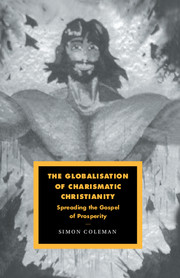Book contents
- Frontmatter
- Contents
- List of illustrations
- Acknowledgements
- Introduction
- Chapter One A ‘weird babel of tongues’: charisma in the modern world
- Chapter Two ‘Faith which conquers the world’: globalisation and charisma
- Chapter Three Sweden: national ‘state’ and global ‘site’
- Chapter Four The Word of Life: organising global culture
- Chapter Five Words: from narrative to embodiment
- Chapter Six Aesthetics: from iconography to architecture
- Chapter Seven Broadcasting the faith
- Chapter Eight Expansive agency
- Chapter Nine Contesting the nation
- Chapter Ten The Word and the world
- References
- Index
Chapter Three - Sweden: national ‘state’ and global ‘site’
Published online by Cambridge University Press: 22 September 2009
- Frontmatter
- Contents
- List of illustrations
- Acknowledgements
- Introduction
- Chapter One A ‘weird babel of tongues’: charisma in the modern world
- Chapter Two ‘Faith which conquers the world’: globalisation and charisma
- Chapter Three Sweden: national ‘state’ and global ‘site’
- Chapter Four The Word of Life: organising global culture
- Chapter Five Words: from narrative to embodiment
- Chapter Six Aesthetics: from iconography to architecture
- Chapter Seven Broadcasting the faith
- Chapter Eight Expansive agency
- Chapter Nine Contesting the nation
- Chapter Ten The Word and the world
- References
- Index
Summary
I now wish to discuss Sweden as a cultural, social and political context for globalising, charismatic Protestantism. In doing so, I attempt to convey a sense of the broad institutional and ideological background that has played a considerable part in influencing not only Word of Life members' understandings of their mission, but also the opinions of those who oppose the group with such force. More generally, I provide a perspective on a tension that runs throughout the book as a whole, concerning the extent to which understandings of national identity – cultivated by religious or other interest groups – mesh with or contradict more universalising orientations towards the idea of ‘humanity’ as a whole.
Let me begin by presenting two images of Sweden, separated widely in time and context of production. The first is provided by an ambitious Swedish scholar of the seventeenth century, Olof Rudbeck (1630–1702). Attempting to curry favour in the present by depicting a convenient vision of the past, he published a book in 1672 that purported to demonstrate that Sweden was the cradle of world civilisation (Gaunt and Löfgren 1984:221). Sweden, according to Rudbeck's scholarly ruminations, was actually the real Atlantis. The country had apparently been founded soon after the biblical flood, and could therefore be considered the world's oldest kingdom. Rudbeck's text included an engraving with a globe – and of course the author – in the centre of the picture.
- Type
- Chapter
- Information
- The Globalisation of Charismatic Christianity , pp. 72 - 86Publisher: Cambridge University PressPrint publication year: 2000

